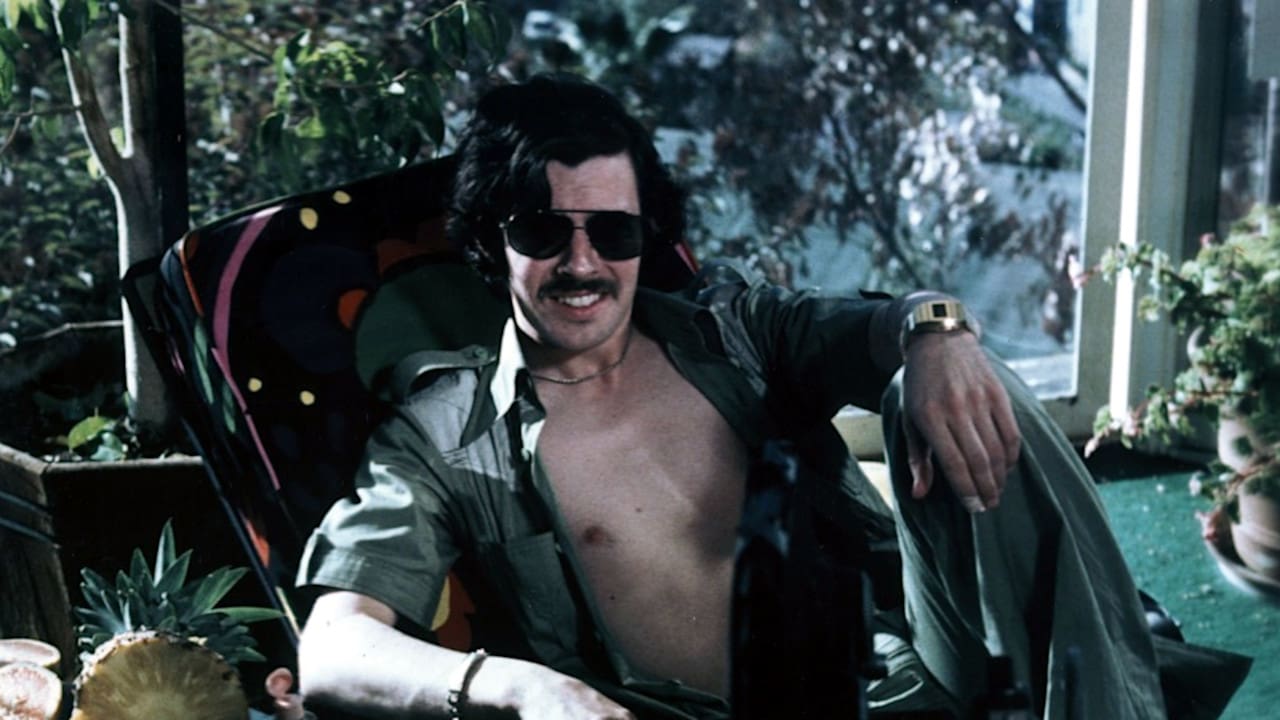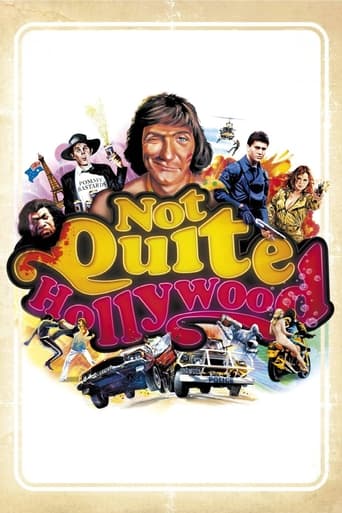Incannerax
What a waste of my time!!!
Doomtomylo
a film so unique, intoxicating and bizarre that it not only demands another viewing, but is also forgivable as a satirical comedy where the jokes eventually take the back seat.
Bob
This is one of the best movies I’ve seen in a very long time. You have to go and see this on the big screen.
Cassandra
Story: It's very simple but honestly that is fine.
Woodyanders
In the wake of the social upheavals of the late 60s and early 70s, fiercely wild, brazen, and shameless exploitation pictures exploded across drive-in movie screens all over Australia. Made on shoestring budgets by blithely bold and driven maverick indie filmmakers, these movies pushed the envelope when it came to unflinchingly explicit content being presented full-on with a certain cheeky verve and delightful lack of inhibition. Indeed, the choice crazy clips showcased herein are ripe to bursting with gleefully vulgar humor, outrageously over-the-top action (nobody photographs madly careening vehicular carnage quite like the Aussies), oodles of tasty female nudity, and unsparingly graphic violence. Energetically covering everything from bawdy soft-core comedies to slam-bang four-sheets-to-the-wind action to schlocky sci-fi to gory horror, edited with galvanizing rapid-fire ferocity, and rattling along at a dizzying speedy pace, this documentary bristles with a raw, trashy, and anarchic vitality that's a total rowdy treat to behold. The eclectic array of interview subjects adds immensely to the infectiously delirious merriment: Down Under directors Richard Franklin, Brian Trenchard-Smith, Philippe Mora, and Russell Mulcahy, lovely actresses Cassandra Delaney, Lynda Stoner, Wendy Hughes, Joanne Samuel, Candy Raymond, and even super-smokin' 70's "Penthouse" model Cheryl Rixon (who still looks quite hot in her 50's), writer Everett De Roche, producer Anthony I. Ginnane, and actors Roger Ward, Jack Thompson, and John Waters. George Lazenby, Steve Railsback, Stacy Keach, Jamie Lee Curtis, and the always kooky Dennis Hopper relate plenty of cool stories about acting in films in the Land of Oz (the anecdotes about Hopper's drug-fueled antics during the making of "Mad Dog Morgan" are simply priceless). Moreover, there's a wonderfully gonzo tribute to Grant Page, who's without a doubt one of the most fearless and underrated stuntman in the history of cinema. The sole minor flaw in this otherwise excellent documentary is the ubiquitous Quentin Tarantino's overly gushy fanboy raving; while QT's obvious knowledge on and affection for Ozploitation is genuine and admirable, his insufferably spazzy filmgeek posturing gets pretty tiresome after a while. Essential viewing.
misbegotten
Not Quite Hollywood: The Wild, Untold Story of Ozploitation examines how Australia didn't really have a movie industry to call it's own until the beginning of the Seventies, but once they got started the Aussies mostly bypassed making worthy and critically-respectable films, and instead embraced the various genres associated with low budget B movies, churning out sex comedies & skin flicks, horror films and action thrillers. The documentary contains clips and discussion on many Australian films that I've already seen or was aware of - TURKEY SHOOT, SKY PIRATES, SNAPSHOT, RAZORBACK, LOST WEEKEND, PATRICK, THE SURVIVOR, ROAD GAMES, HARLEQUIN, etc (sadly the wannabe sci-fi epic THE TIME GUARDIAN is only represented by a quick glimpse of it's poster) - and a few that I'd not previously heard of, but would now like to track down. FAIR GAME (1985) and THE MAN FROM HONG KONG both look as though they're an absolute blast.There are dozens of interviewees, most of whom are surprisingly candid: Steve Railsback has nothing good to say about TURKEY SHOOT, and the movie's producer admits that due to lack of time and money, live rounds were fired close to actors during some of the action scenes. Jamie Lee Curtis remembers being subjected to a hate campaign while shooting ROAD GAMES, for allegedly taking work away from Australian actresses. Wendy Hughes recalls that after doing a topless scene in one film, most of the reviews discussed the shape of her breasts at length and didn't mention her performance. Everybody involved in MAD DOG MORGAN tells of how Dennis Hopper spent the entire shoot out of his head on drugs (we see behind-the-scenes footage confirming this), and Hopper himself reveals that during production he was arrested for drunk driving and the police doctor told him that based on the amount of alcohol in his bloodstream, he was technically dead.Not Quite Hollywood is a wonderful celebration of Australia's frequently ignored movie output, and is well worth watching.
Coventry
Having watched "Not Quite Hollywood: The Wild, Untold Story of Ozploitation!" is eventually going to cost me a lot of money in the long run, as I added yet another handful of obscure movies to my never-ending list of 'absolutely-must-track-down-purchases'. That is actually the main reason why horror and cult fanatics ought to check this spirited and cheerful documentary out! Not so much because it's highly informative and professionally made (which it is), but mainly because this literally is a gravy train of virtually unknown but seemingly delicious genre titles. You can watch this documentary with a pen & notebook next to you and just start writing down the titles of all out-and-out demented movies they show brief clips of, and I assure that near the end you'll have a whole page full! In case the extended title doesn't make it clear enough yet, "Not Quite Hollywood" is a documentary revolving on the Australian exploitation/B-movie industry in general. This production features tons of clips from movies of the different streams in cult cinema (vulgar 70's sex flicks, brutally gore horror and outrageous car/biker movies), interviews with practically all the pioneers of Aussie cult cinema (like Brian Trenchard-Smith, Richard Franklin and Everett De Roche…) and over-enthusiast testimonies for younger generation directors about how influential these movies were (Greg McLean, James Wan and particularly the always-hyperkinetic Quentin Tarantino). The footage and interviews covering the Sexploitation stream was the least interesting part for me, because I'm not that interested in those films. Still it was nevertheless worthwhile seeing, as this meant the launch of the Aussie exploitation industry, with director icons like John Lamond and Tim Burstall giving birth to Down Under sleaze and vulgarity. There's a surprisingly high amount of little interviews with lewd actresses of that time, so it's really fun to see them showing off their T&A first and then talk about how carefree this era was. The horror movies (comatose killers & outback chillers) and exploitation flicks (high octane disasters and kung-fu masters) are a non-stop spitfire of fantastic images, compelling background information, marvelous on-set anecdotes and enticing bits of gore. It's always a brilliant experience to watch so many of your cinematic heroes assembled in one documentary, and "Not Quite Hollywood" accomplishes exactly this.
jonathan-577
Subtitled "The Wild, Untold Story of Ozsploitation", and that's what we get: a 100-minute cavalcade of all (?) the dizzy highlights of Australian exploitation cinema. The parceling into sex comedy/horror/action subheadings serves the material quite nicely, giving us a broad view of the aesthetic: ideologically working class, plain-spoken, and very male. That latter point is given just enough emphasis as the female participants offer their diverse bewildered reactions to the paces the filmmakers put them through, without getting all superior; the one pompous ass film critic who tries THAT trick is roasted on a spit. There's a lot of initiative, energy, and inspiration on display in this exhausting avalanche of quick clips; I was writing down titles like a mad man, there's a lot of stuff I'd never heard of that I'm dying to see. Genre film-making is presented, rhetorically, as a polar alternative to the classy upmarketing of familiar exports like Peter Weir, Bruce Beresford et al...even though Beresford was responsible for the Barry McKenzie series and Weir bequeathed us The Cars That Eat People. But dichotomy or not, I can tell you with certainty that Patrick has now jumped The Last Wave on my must-see list. Quentin Tarantino is dispensed in quantity, but I didn't get annoyed; he knows of what he speaks, and he's well-mixed with the folks who were there.

